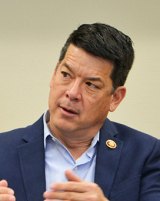Rep. TJ Cox: Securing much-needed funding for Central Valley communities

First, we must act without hesitation to save lives. Second, we must use our resources to protect working families and small businesses.
Last week, Congress passed our third bipartisan response, the CARES Act, to address the coronavirus crisis by delivering $2.2 trillion for hospitals, health care systems, workers, small businesses, students, and state and local governments. This bill builds on two bipartisan bills previously signed into law that boosted prevention, increased preparedness, and supported families.
Even in good times, large numbers of Valley families live paycheck-to-paycheck, so one of the most important components of this bill is a mandate that families get relief as soon as possible. I’ve urged the president to allow the Treasury to deposit payments directly into taxpayers’ bank accounts instead of delaying it with paper checks. Most families will get immediate cash payments in the next few weeks.
Democratic revisions to the bill dramatically increased unemployment benefits for the average furloughed or laid-off worker. Californians are eligible for up to 26 weeks of unemployment benefits from the state, with an extra $600 per week supplement from the CARES Act over the first four months of job separation. Recognizing the changing nature of our workforce, we made sure self-employed workers, independent contractors, and gig economy workers were also covered.
The bill included $200 billion for hospitals, community health clinics, health care workers, research and equipment, including ventilators, N95 masks, gowns, gloves, and personal protective equipment (PPE) for front-line medical workers who are risking their lives every day.
In addition, the legislation provides $150 billion in relief to state and local governments, and $12 billion to continue the fight against homelessness, which was already at a crisis level before this outbreak.
To make sure small businesses won’t be left behind, we secured $349 billion for new lending programs, including forgivable loans, debt relief, and disaster grants to help them weather the storm.
In good news for Central Valley students, we secured billions in emergency education funding and eliminated the income tax on student loan repayment assistance by employers.
Finally, I’m glad to have secured $200 million in funding to make telehealth more accessible for Central Valley communities — something that I’ve personally been pushing for since my first day in Congress. No one should have to drive up to an hour away to obtain care if they can get quality health care in the comfort of their own home.
The CARES Act is a great start, but it’s not without significant shortcomings. This bill denies benefits to mixed status (citizen/non-citizen households). It also fails to protect our farm workers, and in a time of increasing food insecurity, it doesn’t raise dangerously low Supplemental Nutrition Assistance (SNAP) benefits.
While this relief package will provide critical emergency assistance our Valley needs now, I know we still have more work to do, and I will be working for you every day as Congress crafts the next package.
In the meantime, I will be holding tele-town halls and online briefings to help constituents and businesses in the Valley access the economic relief and stimulus funds provided by the CARES Act and the other recently passed legislation.
Please visit my website at Cox.House.Gov, and our Central Valley Coronavirus Information Center for the latest updates on how to keep your family safe. My team and I are at your service so, please don’t hesitate to reach out if we can help with Social Security, Medicare, Veterans benefits or any other federal government issue.
Most importantly, let’s all say “Thank you” to our first responders, the front-line medical workers, janitors, grocery store workers, mail and delivery people, farmers and farm workers and other essential employees. They are today’s real-life heroes.
Because of them, and to the families like your own who are sacrificing by staying home and showing kindness to your neighbors, I know that we will all get through this together. Let’s stay safe, stay home, and wash our hands.
Opinion
- Valadao supports rural cooperatives, communities with legislation
- Kings Democrats condemn vandalism at Rep. Valadao's Hanford office
- Breaking down barriers to care and protecting seniors' well being
- A public perspective on health care and Medicare Advantage
- The Leader recommends Lupe Solis, Joe Neves be returned to local elected positions
- Westlands Water District celebrates 70th anniversary in San Joaquin Valley
_0.jpg)

.jpg)



